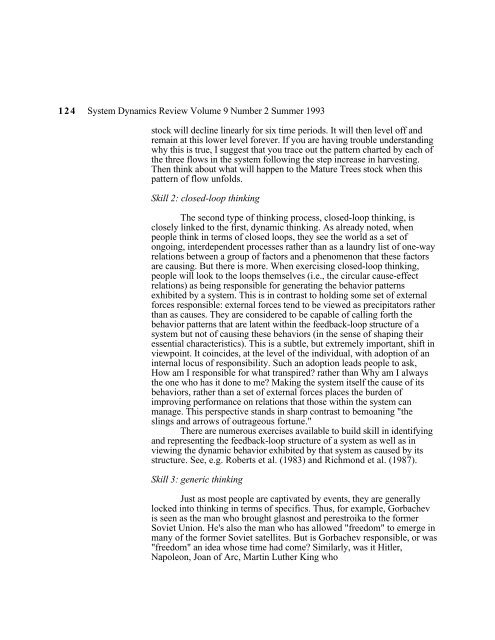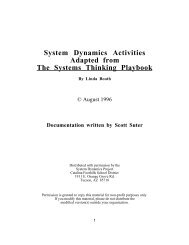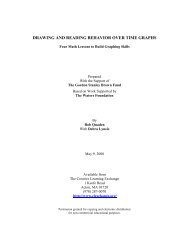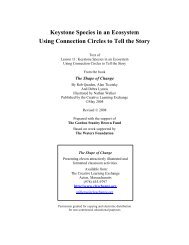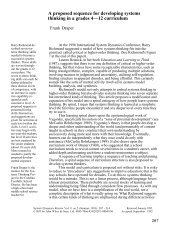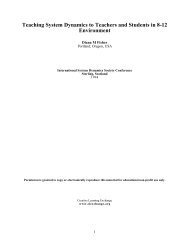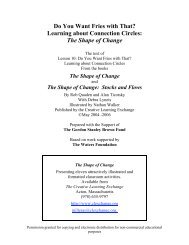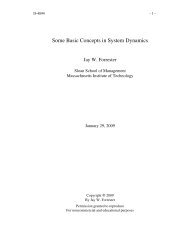Systems thinking: critical thinking skills for the 1990s and beyond
Systems thinking: critical thinking skills for the 1990s and beyond
Systems thinking: critical thinking skills for the 1990s and beyond
- No tags were found...
Create successful ePaper yourself
Turn your PDF publications into a flip-book with our unique Google optimized e-Paper software.
124 System Dynamics Review Volume 9 Number 2 Summer 1993stock will decline linearly <strong>for</strong> six time periods. It will <strong>the</strong>n level off <strong>and</strong>remain at this lower level <strong>for</strong>ever. If you are having trouble underst<strong>and</strong>ingwhy this is true, I suggest that you trace out <strong>the</strong> pattern charted by each of<strong>the</strong> three flows in <strong>the</strong> system following <strong>the</strong> step increase in harvesting.Then think about what will happen to <strong>the</strong> Mature Trees stock when thispattern of flow unfolds.Skill 2: closed-loop <strong>thinking</strong>The second type of <strong>thinking</strong> process, closed-loop <strong>thinking</strong>, isclosely linked to <strong>the</strong> first, dynamic <strong>thinking</strong>. As already noted, whenpeople think in terms of closed loops, <strong>the</strong>y see <strong>the</strong> world as a set ofongoing, interdependent processes ra<strong>the</strong>r than as a laundry list of one-wayrelations between a group of factors <strong>and</strong> a phenomenon that <strong>the</strong>se factorsare causing. But <strong>the</strong>re is more. When exercising closed-loop <strong>thinking</strong>,people will look to <strong>the</strong> loops <strong>the</strong>mselves (i.e., <strong>the</strong> circular cause-effectrelations) as being responsible <strong>for</strong> generating <strong>the</strong> behavior patternsexhibited by a system. This is in contrast to holding some set of external<strong>for</strong>ces responsible: external <strong>for</strong>ces tend to be viewed as precipitators ra<strong>the</strong>rthan as causes. They are considered to be capable of calling <strong>for</strong>th <strong>the</strong>behavior patterns that are latent within <strong>the</strong> feedback-loop structure of asystem but not of causing <strong>the</strong>se behaviors (in <strong>the</strong> sense of shaping <strong>the</strong>iressential characteristics). This is a subtle, but extremely important, shift inviewpoint. It coincides, at <strong>the</strong> level of <strong>the</strong> individual, with adoption of aninternal locus of responsibility. Such an adoption leads people to ask,How am I responsible <strong>for</strong> what transpired? ra<strong>the</strong>r than Why am I always<strong>the</strong> one who has it done to me? Making <strong>the</strong> system itself <strong>the</strong> cause of itsbehaviors, ra<strong>the</strong>r than a set of external <strong>for</strong>ces places <strong>the</strong> burden ofimproving per<strong>for</strong>mance on relations that those within <strong>the</strong> system canmanage. This perspective st<strong>and</strong>s in sharp contrast to bemoaning "<strong>the</strong>slings <strong>and</strong> arrows of outrageous <strong>for</strong>tune."There are numerous exercises available to build skill in identifying<strong>and</strong> representing <strong>the</strong> feedback-loop structure of a system as well as inviewing <strong>the</strong> dynamic behavior exhibited by that system as caused by itsstructure. See, e.g. Roberts et al. (1983) <strong>and</strong> Richmond et al. (1987).Skill 3: generic <strong>thinking</strong>Just as most people are captivated by events, <strong>the</strong>y are generallylocked into <strong>thinking</strong> in terms of specifics. Thus, <strong>for</strong> example, Gorbachevis seen as <strong>the</strong> man who brought glasnost <strong>and</strong> perestroika to <strong>the</strong> <strong>for</strong>merSoviet Union. He's also <strong>the</strong> man who has allowed "freedom" to emerge inmany of <strong>the</strong> <strong>for</strong>mer Soviet satellites. But is Gorbachev responsible, or was"freedom" an idea whose time had come? Similarly, was it Hitler,Napoleon, Joan of Arc, Martin Lu<strong>the</strong>r King who


